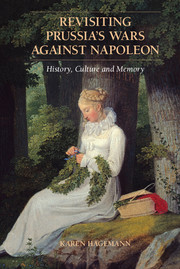Book contents
- Frontmatter
- Epigraph
- Contents
- List of Figures and Maps
- List of Abbreviations
- Acknowledgments
- Revisiting Prussia’s Wars against Napoleon
- Part One A History of Defeat, Crisis and Victory
- Part Two Discourses on the Nation, War and Gender
- Part Three Collective Practices of De/Mobilization and Commemoration
- Part Four Literary Market, History and War Memories
- Part Five Novels, Memory and Politics
- Epilogue Historicizing War and Memory, 2013–1813–1913
- Bibliography
- Name Index
- Subject Index
- Plate section
Part Four - Literary Market, History and War Memories
Published online by Cambridge University Press: 05 March 2015
- Frontmatter
- Epigraph
- Contents
- List of Figures and Maps
- List of Abbreviations
- Acknowledgments
- Revisiting Prussia’s Wars against Napoleon
- Part One A History of Defeat, Crisis and Victory
- Part Two Discourses on the Nation, War and Gender
- Part Three Collective Practices of De/Mobilization and Commemoration
- Part Four Literary Market, History and War Memories
- Part Five Novels, Memory and Politics
- Epilogue Historicizing War and Memory, 2013–1813–1913
- Bibliography
- Name Index
- Subject Index
- Plate section
Summary
Literary Market, History and War Memories
This book takes us back to the time when the German people learned to conceive of itself as a single entity, when the Germans’ new national sentiment emerged, the time whence comes the political unity we enjoy today: to the year 1813, then to 1848 and 1870; and there have doubtless been changes and conflicts, and some contradictions and unfinished business remain, but ever since 1813 the German people has harbored thoughts of unification and inner consolidation: it has awakened.
These words introduce an extensive two-volume work entitled The Time of the French in the German Lands, 1806–1815, a collection of lavishly illustrated eyewitness accounts and documents from the period of the “Wars of Liberation.” The Leipzig fi rm of R. Voigtl ä nder published the first edition in 1908. Its editor Friedrich Schulze had studied literature and art history in Jena and Leipzig. From 1910 he was on the staff of the newly founded Leipzig Museum, where he became director in 1918. Schulze was one of the many authors who published commemorative works to mark the centenary of the Anti-Napoleonic Wars of 1806–15. His work was extraordinarily widely read, reprinted several times, and can be found even today in many libraries. It was among the numerous richly illustrated, glossy publications that middle-class Germans displayed in their living rooms as a mark of their education and patriotism.
- Type
- Chapter
- Information
- Revisiting Prussia's Wars against NapoleonHistory, Culture, and Memory, pp. 249 - 252Publisher: Cambridge University PressPrint publication year: 2015

